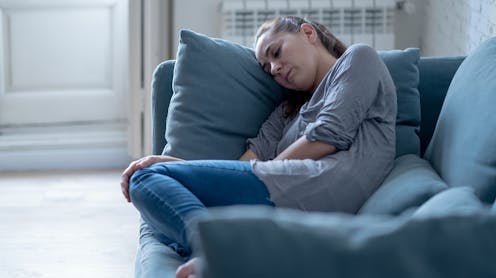Source: The Conversation (Au and NZ) – By Andrew Baillie, Professor of Allied Health, University of Sydney
COVID might be the largest mass casualty event in Australian history. And with one in 20 people with COVID still experiencing symptoms three months later, long COVID might even become Australia’s most significant cause of longer-term disability.
Around eight million Australians are estimated to have been infected with COVID during the pandemic, so a prevalence of 5% means 400,000 people could have long COVID. With more than 30,000 new cases of COVID detected each day in Australia, long COVID is becoming increasingly common.
We’ve known for some time that getting vaccinated reduces your chance of long COVID. Now new data suggests getting boosted further reduces your chance of long COVID.
But it’s still possible to get long COVID after being vaccinated – and Australia needs to be better prepared for this.
Read more:
You’re much less likely to get long COVID if you’ve been vaccinated
Remind me, what’s long COVID?
Long COVID is a potentially debilitating condition which follows the acute or early phase of COVID infection.
Affected people have described many symptoms, the most common being shortness of breath, fatigue, fever, headaches and “brain fog”.
While clinicians are familiar with post-viral or post-infective syndromes, long COVID is new. There is no diagnostic test, and it’s likely it’s really a mixture of different conditions with different underlying causes.
Different time-frames are used to define it. According to the Australian Department of Health, a person experiences long COVID when their symptoms remain four weeks after they first had COVID.
The World Health Organization says long COVID is usually three months from infection, lasts at least two months, and cannot be explained by another diagnosis.

Shutterstock
What role does vaccination play?
People who are vaccinated are less likely to get COVID, have less severe COVID, and are less likely to pass it on.
People who are vaccinated are also less likely to get long COVID, with lower rates among those who have had their boosters.
Self-reported data from the United Kingdom compared symptoms in people who received two or three doses of vaccine and between the Delta and Omicron (BA1 or BA2) variants of COVID.
Some 9.5% of people who were likely infected with Delta and were double vaccinated reported long COVID symptoms that limited their activities. The rate for those who were triple vaccinated was less than half: 4.4%.
For Omicron, the rate was 6.2% for those likely to have had BA1 and were double vaccinated, and 5.3% with BA1 who were triple vaccinated.
Read more:
Long COVID: vaccination could reduce symptoms, new research suggests
These results are considered indicators only because the data was self-reported. But although we can’t yet be absolutely sure, triple vaccination looks to be associated with lower rates of long COVID.
Putting it all together, we estimate about 5% of people who had COVID in Australia will develop long COVID.
Children and adolescents appear to be less likely to get long COVID than adults and many will recover with time. But still, up to one in 50 children may get long COVID.
While vaccination protects children and young people from COVID, we don’t yet know if those kids who get breakthrough COVID infections after vaccination will be any more or less likely to develop long COVID.
It’s not yet clear whether vaccination improves symptoms and quality of life for people who already have long COVID. A recent UK review of the evidence suggests it might.
People with long COVID need support
People with long COVID have banded together on social media platforms to support each other, to share information, and to advocate for better care.
The Facebook group Australia Long COVID Community has more than 1,400 members. Many describe severe symptoms with significant disability, and difficulty returning to work.
While most people who are infected with COVID will recover without help, the 5% who get long COVID will often need health care to support them to recover. This support can be intensive and take time.
But Australia’s health, welfare, and disability services are under-prepared. We also have very little information about the number of people with long COVID, as health minister Mark Butler acknowledged last week:
So what do governments need to do?
We need to prepare our health, welfare, and disability services to support the growing number of Australians with long COVID. At a national level, we need:
- surveillance for long COVID to track rates, symptoms and impact on work and quality of life over time
- better support and resources for GPs to treat long COVID in primary care
- more specialist long COVID clinics for those with more complex problems
- disability supports for people whose problems become long-lasting
- research to understand long COVID and how to best treat it.
Current recommendations are to see your GP for help with long COVID. But while GPs have experience managing post viral illnesses and there are guidelines for the care of post-COVID conditions, GPs are likely to need additional support and resources to respond.
Specialist long COVID clinics are opening in capital cities and regional centres to provide additional care. While these efforts are encouraging, they are likely to only be able to respond to a small proportion of the people who need help for long COVID.
In the US, President Joe Biden has pushed for people with long COVID to have access to federal disability supports. We need a similar plan in Australia.
Let’s not repeat the mistakes of stigmatising and dismissing earlier post-viral or post-infective syndromes like chronic fatigue syndrome. The devastating impact on those struggling to get a diagnosis, and adequate treatment and supports is still felt.
Read more:
We need to brace for a tsunami of long COVID. But we’re not quite sure the best way to treat it
![]()
Andrew Baillie works for The University of Sydney in a position partially funded by Sydney Local Health District. He receives funding from the National health and Medical Research Council. He is affiliated with the Long-COVID Australia Collaboration.
Maree Teesson is Chair of Australia’s Mental Health Think Tank which is funded by the BHP Foundation. She is Director of The Matilda Centre, The University of Sydney. She is chair of the Million Minds Mission. She receives funding from the National Health and Medical Research Council, the Australian Government, BHP Foundation, Paul Ramsay Foundation and other research organisations. She is co-director of CLIMATESchools PTY LTD a company established in 2015 to distribute evidence resources to education organisations.
Philip Britton receives funding from the National Health and Medical Research Council, the Medical Research Future Fund, the Royal Australasian College of Physicians and the Commonwealth Department of Health
Tania Sorrell receives funding from NHMRC, ARC, MRFF, NSW Office of Health Medical Research
– ref. Triple vaccination seems to reduce the chance of long COVID – but we still need to prepare for a jump in cases – https://theconversation.com/triple-vaccination-seems-to-reduce-the-chance-of-long-covid-but-we-still-need-to-prepare-for-a-jump-in-cases-183428








